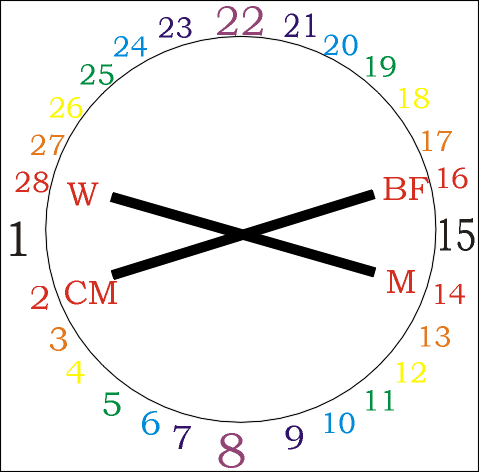
F: Self-distrust
F: Moroseness
28 FCM
2 TM
| The attributes of the Faculties when Will is at Phase 28 | derived from | modified by | from | description | ||
| Will | The Fool | 28 | ||||
| Mask | True | Oblivion | 14 | BF | 2 | Enforced love of the world |
| False | Malignity | CM | 16 | Emotional will | ||
| Creative Mind | True | Physical activity | 2 | BF | 14 | None except monotony |
| False | Cunning | FCM | 28 | Moroseness | ||
| Body of Fate | The Fool is his own Body of Fate | 16 | ||||
| Composite of Faculties | |
|---|---|
| true | The fool seeks to deliver physical activity, modified by monotony, from oblivion, modified by enforced love of the world, with the help of himself. |
| false | The fool is misdirected to cunning, modified by moroseness, bringing malignity, modified by emotional will, separated from himself. |
 | Attributes of Phase 28 | affects | modifies | |
| Will | The Fool | 28 | - | |
| Mask | T:
Serenity
F: Self-distrust | 14 | - | |
| Creative Mind | T:
Hope
F: Moroseness | 2 | 16 TM 28 FCM | |
| Body of Fate | Enforced illusion | 16 | 14 FCM 2 TM | |
Yeats�s description of the phase from A Vision | |
|
The natural man, the Fool desiring his Mask, grows malignant, not as the Hunchback, who is jealous of those that can still feel, but through terror and out of jealousy of all that can act with intelligence and effect. It is his true business to become his own opposite, to pass from a semblance of Phase 14 to the reality of Phase 28, and this he does under the influence of his own mind and body – he is his own Body of Fate – for having no active intelligence he owns nothing of the exterior world but his mind and body. He is but a straw blown by the wind, with no mind but the wind and no act but a nameless drifting and turning, and is sometimes called "The Child of God". At his worst his hands and feet and eyes, his will and his feelings, obey obscure subconscious fantasies, while at his best he would know all wisdom if he could know anything. The physical world suggests to his mind pictures and events that have no relation to his needs or even to his desires; his thoughts are an aimless reverie; his acts are aimless like his thoughts; and it is in this aimlessness that he finds his joy. His importance will become clear as the system elaborates itself, yet for the moment no more need be said but that one finds his many shapes on passing from the village fool to the Fool of Shakespeare.
(AV B 181-82) |
See a broader view of the Phase in the consideration of the Phase Triads.